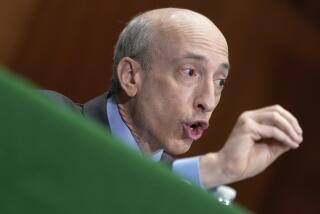NYSE Chief Backs Single Overseer for Securities Markets
- Share via
WASHINGTON — Chairman John J. Phelan Jr. of the New York Stock Exchange told a Senate panel Friday that he would welcome congressional action to give a single federal agency authority to regulate the nation’s securities markets.
But he said he would settle for self-initiated coordination between the Securities and Exchange Commission, the Commodity Futures Trading Commission and the markets themselves. The SEC regulates the stock markets and the CFTC oversees trading in stock index futures.
Phelan, whose testimony before the Senate Banking Committee wound up a week of hearings on the October stock market crash, stopped short of giving absolute endorsement to SEC Chairman John S. Ruder’s proposal earlier in the week that his own agency be made the dominant market regulator.
Single Voice Unlikely
Nor did Phelan push the suggestion of the presidential task force headed by former Sen. Nicholas F. Brady (R-N.J.) that the Federal Reserve Board coordinate all market regulation. He noted the warning of Fed Chairman Alan S. Greenspan that a dominant role for the Fed might lull investors into believing that the central bank’s “deep pockets” stood ready to bail them out in a crash.
“You have to have one single voice, finally,” Phelan told committee Chairman William S. Proxmire (D-Wis.). “We don’t have one now. But if I were to have one silver bullet to solve this, that would be it.”
But in another exchange with Sen Timothy E. Wirth (D-Colo.), Phelan conceded that quick congressional action to create a super-regulator is unlikely.
“It’s probably not possible to say, let’s have one regulator, so it may be we’re not going to get that,” he said. “That’s why we need to get the agencies and the markets to sit down at a table.”
Pending any final solution that Congress might impose, Phelan said, it is urgent that the SEC, the CFTC, the New York and American stock exchanges, the over-the-counter markets and the Chicago-based futures exchanges “form a joint committee and work this out.
“If we can’t get one regulator, then there is a need for the markets and the existing agencies to coordinate,” he added. “And if we are unable to evolve something, then Congress may have to come back in and do it for us. But I think the markets are already beginning to do it.”
The New York Stock Exchange, Phelan pointed out, announced Thursday that it would ban securities firms from using its computer order transfer system for stock index arbitrage--a high-volume trading technique that takes advantage of minuscule differences between the prices of stocks and stock futures--on any day when the Dow Jones industrial index rose or fell 50 points or more.
Phelan said that decision was reached after a Wednesday meeting at which “25 major firms” trading on the exchange almost unanimously called for abolishing all computer program trading, including index arbitrage.
Accepts Most Reforms
The ultimate decision, he said after the hearings, recognized that “we have to adjust to this new world, not try to turn the clock back. The point is not to restrict access, but to control volatility.”
In his testimony, Phelan said that the excessive run-up of share prices in the fevered stock market last summer and the explosive growth in computer-generated program trading probably made the market crash of Oct. 19 inevitable, regardless of any regulatory action.
Phelan said he generally accepted the reforms proposed by the SEC and the Brady Commission and quarreled only with Brady’s criticisms of the behavior of the market’s specialist system on Oct. 19 and 20.
He noted that the SEC report mostly exonerated that system. The stock exchange’s internal investigators, he disclosed, are still looking for any evidence that specialists or other professional traders improperly sold short during the panic.
More to Read
Inside the business of entertainment
The Wide Shot brings you news, analysis and insights on everything from streaming wars to production — and what it all means for the future.
You may occasionally receive promotional content from the Los Angeles Times.










